A COMPLETE GUIDE TO FEEDING QUAIL
Quail have slightly different dietary requirements than other poultry and will need species-appropriate feed to meet their needs. Beyond their base feed, there are a number of other add-ons, treats, and supplemental foods that your quail will appreciate.
This guide to feeding quail will cover everything you need to know about keeping your covey healthy, happy, and well-fed.
This post may include affiliate links. As an Amazon Associate I earn from qualifying purchases. Find more info in my privacy policy.
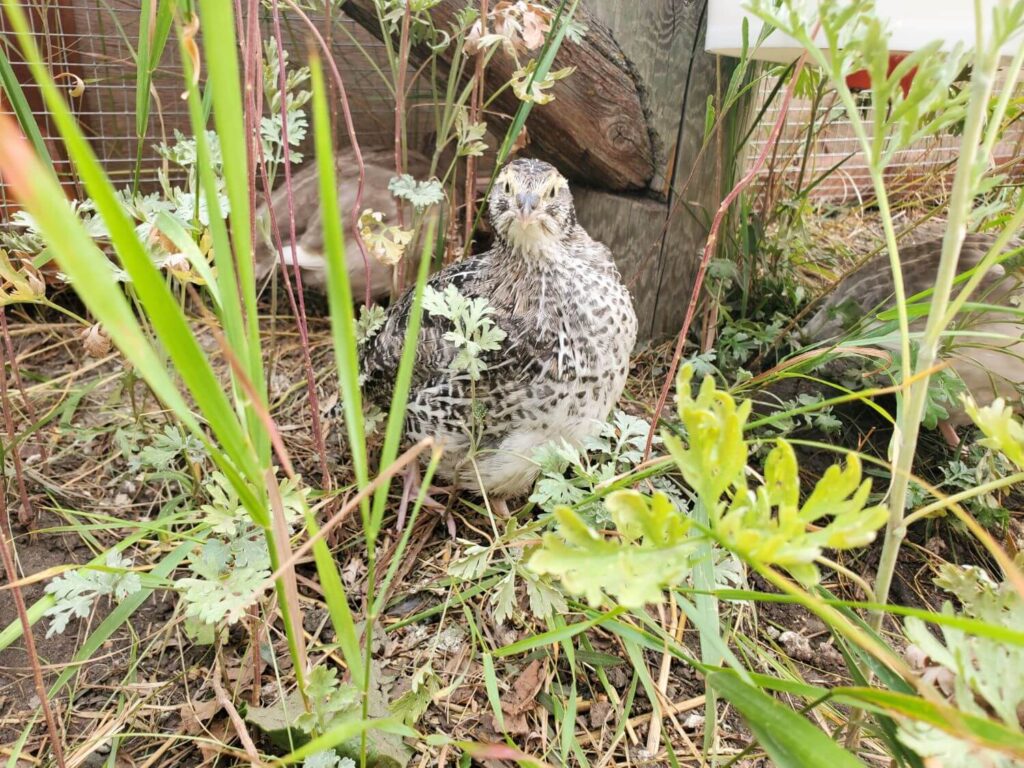
QUAIL FEED BASICS AND PROTEIN REQUIREMENTS
The foundation of your quails’ diet should be a balanced blend of grains and seeds that provide the necessary carbohydrates, nutrients, and protein levels that the birds require.
From hatching to about 6 weeks of age, it is recommended to feed quail chicks up to a 30% protein diet. This can be reduced to a 20-25% protein diet at maturity.
When sourcing quail feed from farm or feed stores, look for a blend specific to game birds. Turkey starter feeds are often similar or interchangeable with game bird feeds and can be an option if a quail-specific feed is not available in your area.
Opt for a crumble rather than a pellet as this will be easier for the small birds to manage.
We have limited local options and do not have access to 30% blends. However, we have successfully raised multiple batches of quail chicks from hatching through adulthood on a 25% protein turkey and game bird feed with no problems.
Thus far, I have solely used commercial feeds as the base of my quails’ diet and have not yet dabbled in DIY quail feed. If this is something you are looking to do, I’d recommend doing some thorough research to ensure your base feed is complete and balanced.
Quail self-regulate their feeding so there is no need to restrict access to their food. A large capacity feeder will allow you to fill less frequently and ensure that your birds have constant access to feed.
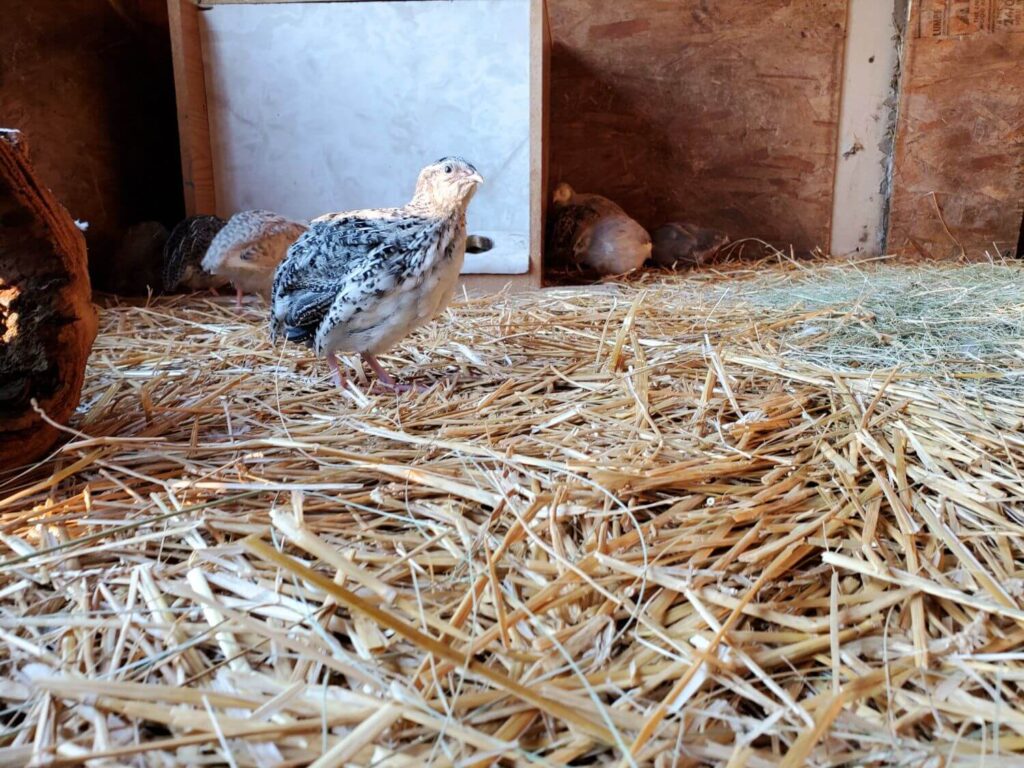
FEED ADD-ONS
In addition to the base feed, there are a few other things that your quail may require.
Calcium is especially important for laying hens as they will require a sufficient amount for healthy eggshell production. One study suggests a calcium ratio of 2.68% for layers. Some feeds will provide enough calcium that you may not have to supplement.
However, if your base feed does not provide sufficient calcium or if you are finding soft-shelled eggs, you should provide free-choice supplemental calcium in the form of oyster shells. You may need to crush the shells down further if they are too coarse for the quail to ingest.
Another option for supplementing calcium is using their own eggshells. It is recommended to rinse and then bake, boil, or microwave the shells before crushing into a powder and providing back to the birds.
Grit is another addition you’ll likely want to offer. If your quail receive only commercial feed, they may not necessarily need grit as it is formulated to be more easily digestible.
However, if your quail have access to forage in an on-ground pen or if you offer them treats such as seeds or insects, you’ll want to make sure to provide grit for them to digest properly.
Grit is readily available online and in feed stores. You can also find grit with a calcium supplement added in to provide both in one product.
I like to offer grit and calcium sources next to but separate from their food source to allow them to self-regulate what they need and avoid any overconsumption.
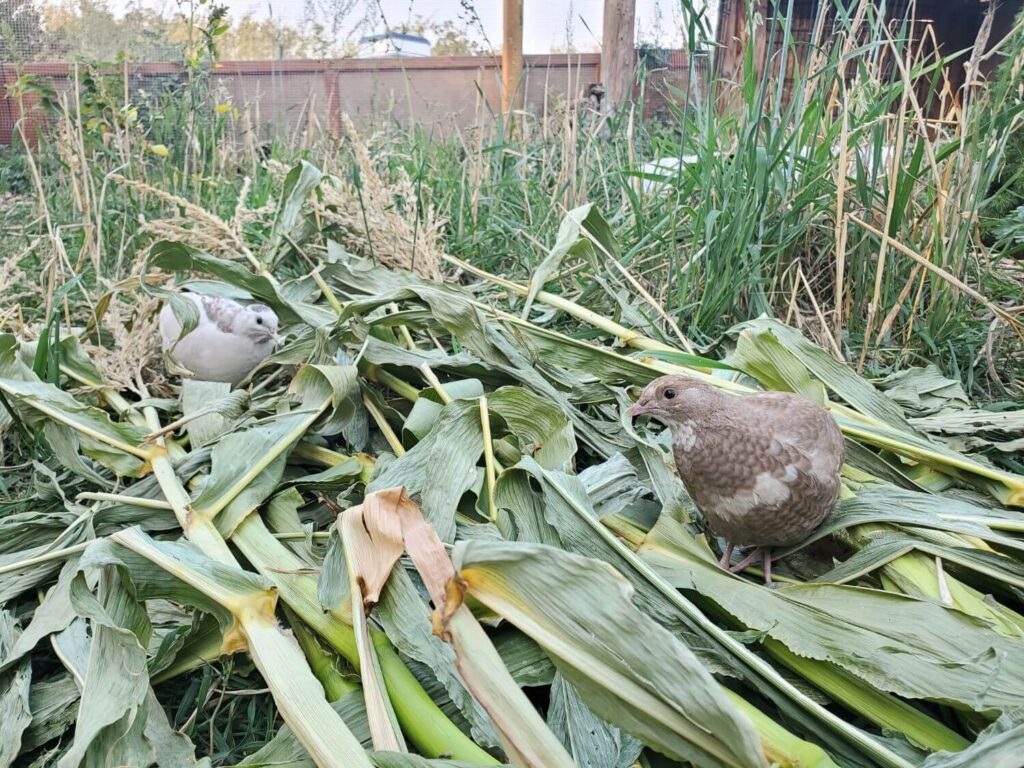
TREATS AND FORAGE FOR QUAIL
While you want the majority of the birds’ diet to consist of the base feed, there are a number of treats you can give your quail for variety, nutritional boosts, and enrichment.
These treats should be fed in moderation and should not make up more than 10% of their diet. Again, I prefer to offer treats separate from their regular feed to have a better idea of how much they are consuming at a time.
If your quail have access to an outdoor, on-ground aviary, consider planting some of the following options for them to forage on their own. This not only helps to vary their diet but also promotes natural foraging behaviours and provides enrichment opportunities.
Portable quail tractors are another great way to offer your birds fresh ground to forage.
VEGETABLES AND FRUIT THAT ARE SAFE FOR QUAIL
While there are a number of fruits and vegetables that your quail can eat, keep in mind that most of these can cause digestive upset in large quantities so be sure to feed in moderation.
The seeds from fruit such as apples and pears and pits from fruits like plums and cherries should be removed prior to feeding.
- Cucumber
- Carrots
- Broccoli
- Cabbage
- Peas
- Currants
- Grapes
- Apples
- Saskatoons
- Snowberries
- Strawberries
- Raspberries
- Blueberries
- Pears
- Plums
- Bananas
- Cherries
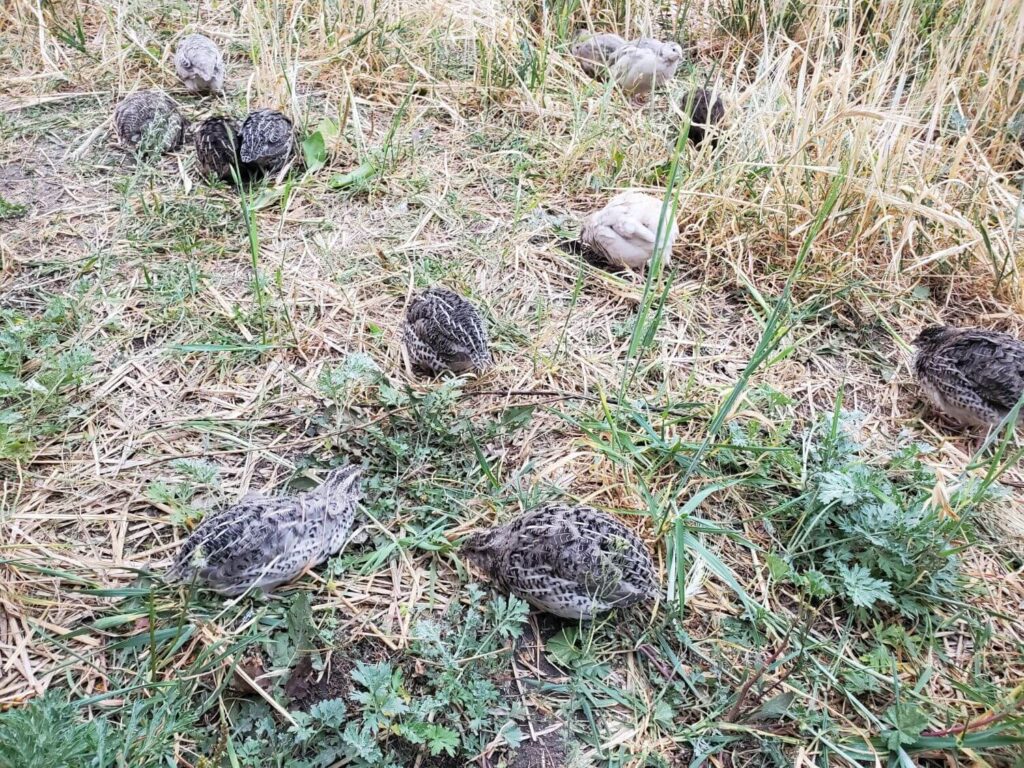
LEAFY GREENS TO FEED QUAIL
Occasional leafy greens are a great option for variety and additional nutrition for quail. In on-ground pens, let weeds like dandelion, chickweed, clover and plantain grow and provide foraging opportunities.
- Clover
- Plantain
- Lettuce
- Spinach
- Sprouts (alfalfa)
- Chickweed
- Kale
- Dandelions
- Carrot tops
- Beet greens
GRAINS, SEEDS, AND NUTS THAT ARE SAFE FOR QUAIL
Because their base feed is made up mainly of grains and seeds, there is no need to supplement their diet with a large amount of these. However, they do appreciate an occasional opportunity to snack on something different.
Our quail love foraging in the grains I plant in their aviary and it’s incredibly cute to watch them jump up and strip a wheat stalk.
- Wheat
- Millet
- Rye
- Oats
- Buckwheat
- Cracked corn
- Broken rice
- Barley
- Sorghum
- Quinoa
- Hemp hearts
- Sunflower
- Flax
- Pumpkin seeds
- Acorns
- Hazelnuts
- Pecans
- Cashews
- Peanuts
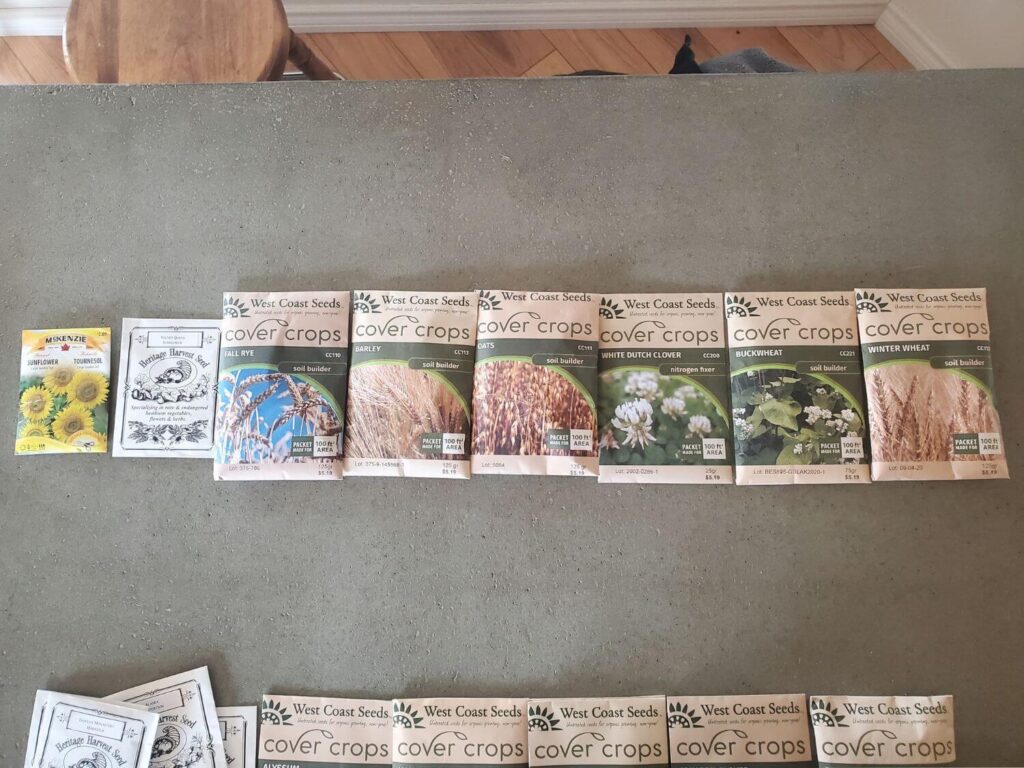
INSECTS TO FEED QUAIL
Insects can be a great treat for quail, particularly during the spring and summer months when layers benefit from a boost in protein. Many of these can be purchased in dried forms online.
Live insects can be provided by allowing them to forage in on-ground pens or in quail tractors.
- Crickets
- Grasshoppers
- Mealworms
- Beetles
- Moths
- Caterpillars
- Ants
- Spiders
- Worms
THINGS TO AVOID: FOODS THAT ARE TOXIC TO QUAIL
Quail are typically good at naturally avoiding toxic foods but there are a few things that you’ll want to retrain from offering.
- Onions
- Alcohol
- Caffeine
- Avocado
- Chocolate
- Pits/seeds from fruit
- Raw potatoes
- Tomato leaves/stems
- Raw beans
- Rhubarb leaves
- Processed foods
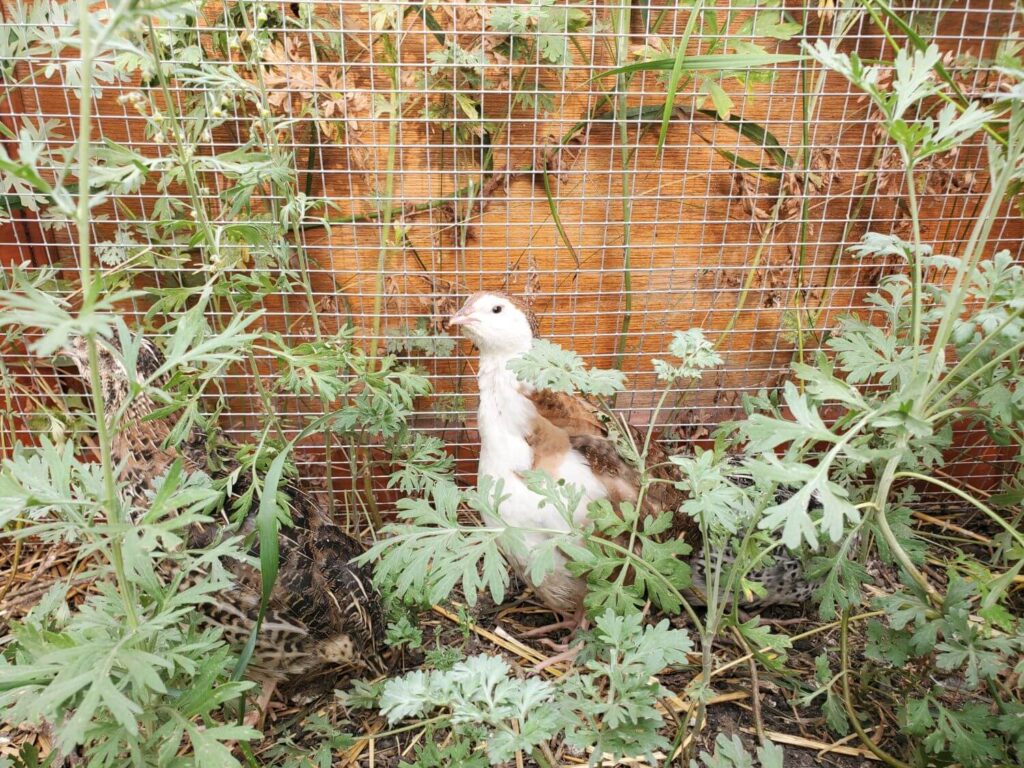
FOODS FOR PARASITE PREVENTION IN QUAIL
While food alone may not be enough to treat an active infestation, there are a number of things you can offer to your quail to help keep parasites at bay and promote the overall health of the birds.
Again, these can be offered occasionally in moderation or provided for the birds to self-medicate when needed.
We have left a number of “weeds” to grow in our aviary, such as wormwood, thistle, and nettle, that the quail will snack on as needed which has worked well for us.
In addition to the list below, magic water is another great thing to offer when looking to boost the overall health and immunity of your covey. You can find my recipe here: MAGIC WATER FOR POULTRY.
- Pumpkin seeds
- Wormwood
- Oregano
- Thyme
- Rosemary
- Mint
- Comfrey
- Lamb’s quarters
- Burdock
- Dandelion
- Stinging nettle
- Canada thistle
Feeding your quail a high-quality base feed along with occasional treats and supplemental foods plays a big role in maintaining a healthy, happy, and enriched covey. I hope this guide was useful in planning how best to feed your quail.
Looking for more quail resources? Check out my other posts here:
EVERYTHING YOU NEED TO KNOW ABOUT RAISING QUAIL
RAISING COTURNIX QUAIL FOR MEAT

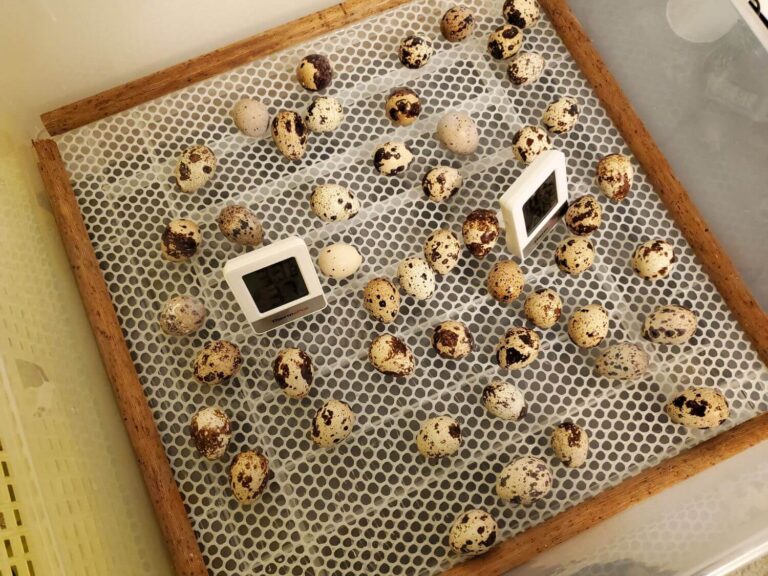

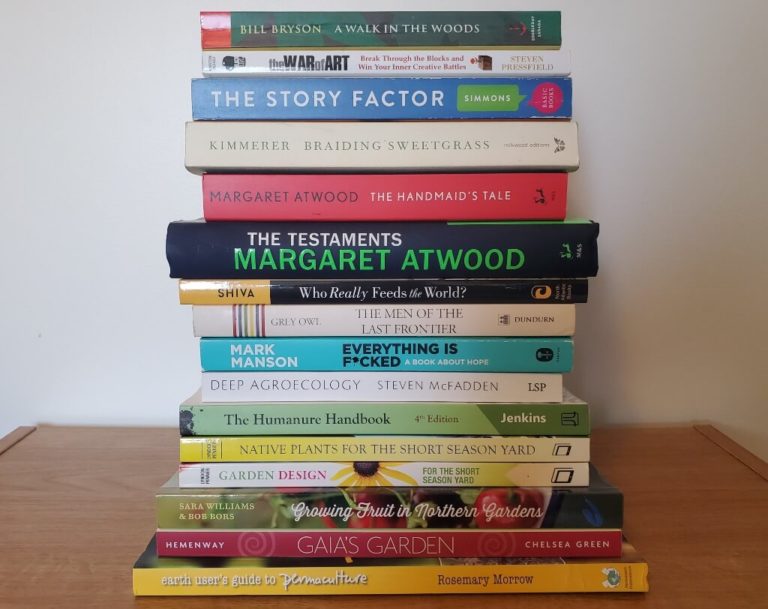

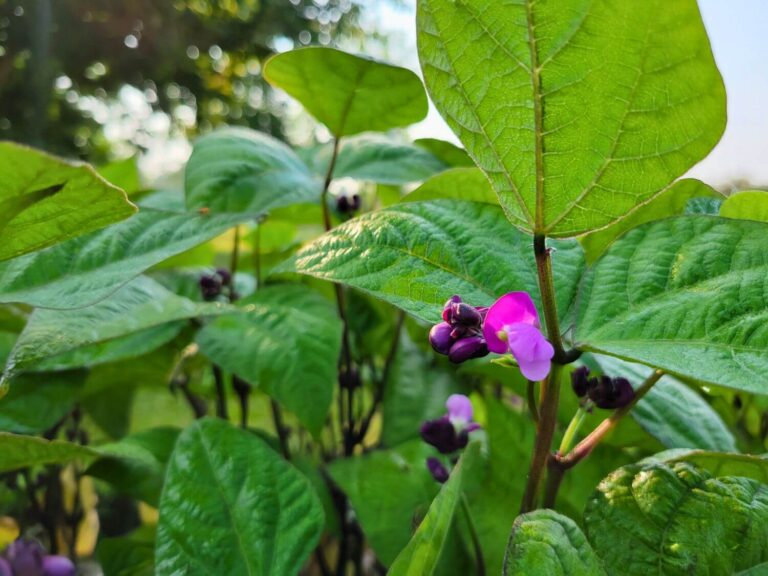

Laura, Enjoyed so very much the article A Complete Guide to Brooding Quail Chicks..
Do you have any books out on raising Quail, that can be purchased? I have been raising
Quail for about 2 plus years for eggs and meat. It has been a learn as you go experience,
but have loved it.
Thank you for your insights.
Nancy Johnston
Hi Nancy, I’m glad you enjoyed the article! Unfortunately I do not have a book available for purchase but if you go to the article: Everything You Need to Know About Raising Quail, you’ll find a good overview plus links to all the quail-related posts I have available on the site in one place. Hope that helps! -Laura